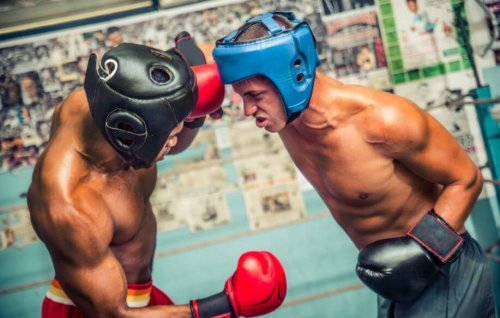7 Great Tips if You're a Boxing Beginner

Boxing is one of the most complete sports since it’s both a cardio and strength training workout. It also involves self-defense. In this article, we’ll give you some great advice that’ll be very useful to you if you’re a boxing beginner.
You might like: Best Boxing and Kickboxing Equipment
Seven great tips for the boxing beginner
Boxing is such an exciting sport. Even if you’re not really into the idea of a contact sport, you can train in this very complete discipline to improve your endurance, lose weight, or tone your muscles.
Many people choose to take up recreational boxing because it’s a fun way to get some exercise without having to get in the ring. In any case, these tips could be of help to you if you’re a boxing beginner or thinking about taking up the sport.
1. The boxing beginner should always stay calm
Whatever your goal may be (exercising or competing), you need to go slowly. A lot of times, a boxing beginner will want to put on the gloves and get in the ring on the first day, or they’ll expect that they’ll be able to execute a good hit right away.
However, you need to keep in mind that this is a discipline that requires quite a lot of technique and it’s not about hitting randomly. Pay attention to what your teacher or coach is telling you, and learn to be patient.
2. Drink plenty of water
Boxing sessions can be pretty tough and, in many cases, they last at least an hour. For this reason, it’s absolutely essential that you stay hydrated.
Doctors recommend that you drink a liter of water for every 60 minutes of training. If you’re not a big fan of water, you can replace it with a sports drink, natural fruit juice, or cold infusions such as iced green tea. That being said, never stop hydrating!

3. The boxing beginner must work on their aim
Another one of the most important tips for a boxing beginner is related to aim. Other than the force of the hit, the first thing you need to work on is hitting where you want to hit. You can work on your aim in front of a mirror or with a punching bag or sparring partner.
Focus your aim on the target you want to hit. When you finally go for a hit, it’ll be easier to do. Once you’re sparring or fighting, keep your focus on your partner’s face so it’s easier to defend yourself from hits.
You might like: Helmets and Mouth Guards For Boxing And Kickboxing
4. Learn to breathe properly
Proper breathing is the basis of every sport and type of exercise. In the case of boxing, you need to inhale air right before you hit and exhale on your follow-through. With this method, you won’t tire as easily.
You can utilize different techniques or movements to slow your heartbeat and also your breathing. Of course, this is a skill you’ll also be working on during your training sessions.
5. Use your entire body when you hit
While the hit comes from your fist, your entire body is the force behind that hit. When you’re starting out, it’s likely you’ll be slow on your feet. Don’t worry: you can take advantage of this slowness to gain strength and increase the power of your hits.
For example, when you’re executing a cross or jab, it’s essential that you push your shoulders forward. This will increase the power of your hit.
Your hips also need to move and your legs should never be static. This is one of the most basic rules of boxing: use all of your strength and your whole body when you’re delivering a hit!
6. Never let your guard down
Even though today’s well-known boxers such as Floyd Mayweather tend to keep their arms down during fights, some wise advice for a boxing beginner is to always keep your guard up.
This means that your hands should be in fists and cover your face and, at the same time, allow you to see your opponent or sparring partner.
When you’re delivering a punch, your other hand should stay covering your face in case your opponent delivers a counter blow.

7. Use safety equipment
You don’t just need a mouthguard. You also need a helmet and jockstrap. While those types of hits aren’t allowed in boxing, in the beginning, you might receive accidental blows to these sensitive areas.
Regarding the helmet, it’ll make you feel safer and more secure the first few times you step into the ring. You can stop using it at a later time. Don’t feel silly wearing a helmet: you need one in order to prevent getting knocked unconscious.
If you’re a boxing beginner, these tips should be quite useful for you. Don’t hesitate to ask your coach any questions you might have. Last but not least, you should spend plenty of time working on your technique and breathing before getting in the ring.
Boxing is one of the most complete sports since it’s both a cardio and strength training workout. It also involves self-defense. In this article, we’ll give you some great advice that’ll be very useful to you if you’re a boxing beginner.
You might like: Best Boxing and Kickboxing Equipment
Seven great tips for the boxing beginner
Boxing is such an exciting sport. Even if you’re not really into the idea of a contact sport, you can train in this very complete discipline to improve your endurance, lose weight, or tone your muscles.
Many people choose to take up recreational boxing because it’s a fun way to get some exercise without having to get in the ring. In any case, these tips could be of help to you if you’re a boxing beginner or thinking about taking up the sport.
1. The boxing beginner should always stay calm
Whatever your goal may be (exercising or competing), you need to go slowly. A lot of times, a boxing beginner will want to put on the gloves and get in the ring on the first day, or they’ll expect that they’ll be able to execute a good hit right away.
However, you need to keep in mind that this is a discipline that requires quite a lot of technique and it’s not about hitting randomly. Pay attention to what your teacher or coach is telling you, and learn to be patient.
2. Drink plenty of water
Boxing sessions can be pretty tough and, in many cases, they last at least an hour. For this reason, it’s absolutely essential that you stay hydrated.
Doctors recommend that you drink a liter of water for every 60 minutes of training. If you’re not a big fan of water, you can replace it with a sports drink, natural fruit juice, or cold infusions such as iced green tea. That being said, never stop hydrating!

3. The boxing beginner must work on their aim
Another one of the most important tips for a boxing beginner is related to aim. Other than the force of the hit, the first thing you need to work on is hitting where you want to hit. You can work on your aim in front of a mirror or with a punching bag or sparring partner.
Focus your aim on the target you want to hit. When you finally go for a hit, it’ll be easier to do. Once you’re sparring or fighting, keep your focus on your partner’s face so it’s easier to defend yourself from hits.
You might like: Helmets and Mouth Guards For Boxing And Kickboxing
4. Learn to breathe properly
Proper breathing is the basis of every sport and type of exercise. In the case of boxing, you need to inhale air right before you hit and exhale on your follow-through. With this method, you won’t tire as easily.
You can utilize different techniques or movements to slow your heartbeat and also your breathing. Of course, this is a skill you’ll also be working on during your training sessions.
5. Use your entire body when you hit
While the hit comes from your fist, your entire body is the force behind that hit. When you’re starting out, it’s likely you’ll be slow on your feet. Don’t worry: you can take advantage of this slowness to gain strength and increase the power of your hits.
For example, when you’re executing a cross or jab, it’s essential that you push your shoulders forward. This will increase the power of your hit.
Your hips also need to move and your legs should never be static. This is one of the most basic rules of boxing: use all of your strength and your whole body when you’re delivering a hit!
6. Never let your guard down
Even though today’s well-known boxers such as Floyd Mayweather tend to keep their arms down during fights, some wise advice for a boxing beginner is to always keep your guard up.
This means that your hands should be in fists and cover your face and, at the same time, allow you to see your opponent or sparring partner.
When you’re delivering a punch, your other hand should stay covering your face in case your opponent delivers a counter blow.

7. Use safety equipment
You don’t just need a mouthguard. You also need a helmet and jockstrap. While those types of hits aren’t allowed in boxing, in the beginning, you might receive accidental blows to these sensitive areas.
Regarding the helmet, it’ll make you feel safer and more secure the first few times you step into the ring. You can stop using it at a later time. Don’t feel silly wearing a helmet: you need one in order to prevent getting knocked unconscious.
If you’re a boxing beginner, these tips should be quite useful for you. Don’t hesitate to ask your coach any questions you might have. Last but not least, you should spend plenty of time working on your technique and breathing before getting in the ring.
All cited sources were thoroughly reviewed by our team to ensure their quality, reliability, currency, and validity. The bibliography of this article was considered reliable and of academic or scientific accuracy.
- Juan Matías Luciano. (2013). El trabajo de la resistencia en el boxeo.
This text is provided for informational purposes only and does not replace consultation with a professional. If in doubt, consult your specialist.








